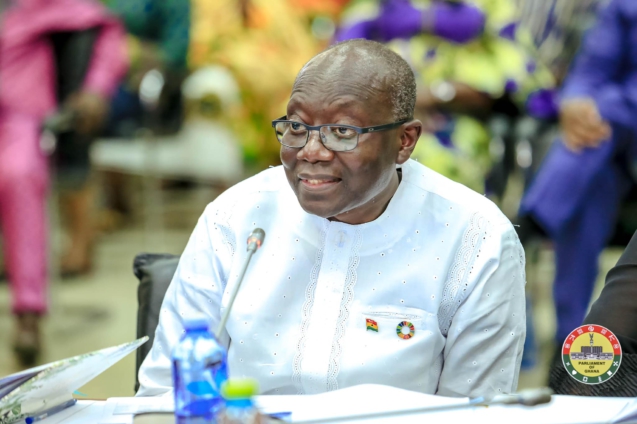The International Monetary Fund is pushing Ghana’s cash-strapped government to stop borrowing from its central bank, according to people familiar with the matter.
The IMF wants the two entities to sign a commitment to zero financing, said the people who asked not to be identified because they’re not authorized to speak publicly on the matter.
The accord is a condition Ghana is required to meet in order to secure final approval for a $3 billion IMF bailout, one of the people said.
An IMF spokesperson didn’t immediately respond to an email seeking comment. Spokespeople for the Ghanaian finance ministry and the central bank didn’t immediately respond to requests for comment.
The decision would bring a halt to central bank loans to the government that amount to about 40 billion cedis ($3.2 billion), according to one of the people.
Central-bank lending to Ghana’s government ballooned last year as investor concern about the state of the nation’s public finances depressed demand for its domestic bonds.
The central bank stepped in to provide funding for the budget and to roll over maturing loans.
An agreement would also bar state-owned enterprises such as the Ghana Cocoa Board, which owes about ¢7 billion, from using more central bank financing, according to the person.
The cocoa regulator — the sole buyer of cocoa from farmers in the world’s second-biggest producer of the chocolate ingredient — uses the funding to support growers.
Auction Undersubscribed
An auction of cocoa bills worth ¢940 million was “severely” undersubscribed last week, the central bank said after it declined to buy the instruments issued by the board.
The central bank used to step in when there were under-subscriptions, Steve Opata, who heads financial markets at the central bank, told Accra-based broadcaster Joy FM earlier this week.
“The bank decided to do things differently, so this shortfall was not financed by the central bank,” he said without giving further detail.
Ghana is overhauling an estimated 467 billion cedis of its loans. It’s been locked out of international capital markets since borrowing costs surged last year on investor concern about the state of Ghana’s public finances.
The country secured a staff-level agreement for a $3 billion IMF bailout last year, but final approval by the IMF board requires the fulfilment of so-called “prior actions,” which haven’t been made public.
It is also negotiating a restructuring plan for its local and external debt in a bid to show that it can make its loans more sustainable, another requirement to tap IMF funding.
Ghana is targeting a reduction in its debt to 55% of gross domestic product by 2028, compared with an IMF estimate of 105% in 2022.
Latest Stories
-
NDC Mining Committee for 2024 campaign refutes allegations of recruiting thugs for elections
3 mins -
Traction Control: A lifesaver with an off switch? Here’s why it exists
7 mins -
I don’t need anyman to woo me with money – Miss Malaika 2024 winner refutes pimping claims
14 mins -
”Kurt Okraku sabotaged my national team career because I refused to sign with Dreams FC” – Najeeb Yakubu
15 mins -
Businesses urged to leverage Generative AI for enhanced customer engagement
18 mins -
MultiChoice Ghana partners with Ghana Hotels Association to elevate guest entertainment
27 mins -
Bawumia’s music streaming app or Mahama’s pay-per-view TV channel?
32 mins -
Karpowership Ghana empowers 40 Takoradi Technical University students with scholarship
34 mins -
We expect significant reduction in prices of petroleum products in coming weeks – CEO AOMC
47 mins -
Betway Africa offers once-in-a-lifetime ‘Play-on-the-Pitch’ experience at Emirates Stadium
56 mins -
I coined the term ‘hype man’ in Ghana – Merqury Quaye
1 hour -
Vasseur questions ‘strange momentum’ of Formula One race director change
1 hour -
“I am disappointed in Kojo Manuel” – Merqury Quaye on “no tie” comment
1 hour -
Nana Kwame Bediako; The beacon of unity
1 hour -
Western Region: NDC youth wing embarks on phase 2 of ‘retail campaign’
2 hours

